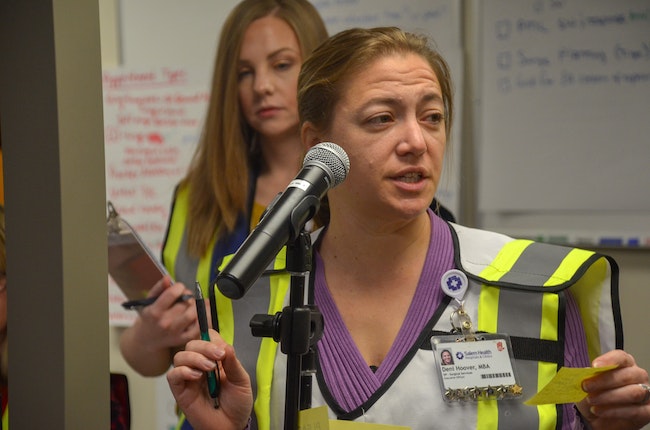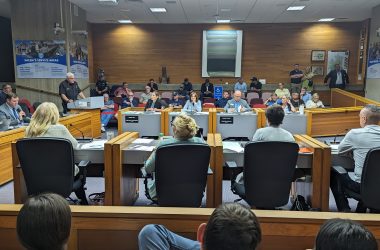
Denise Hoover, incident commander for COVID-19 at Salem Hospital on March 19, 2020, addresses a group of hospital leaders during a daily briefing (Rachel Alexander/Salem Reporter)
NOTE: Salem Reporter is providing free access to its content related to the coronavirus as a community service. Subscriptions help support this.
A windowless ground floor room in Salem Hospital’s Building B has become one of the busiest areas of the hospital.
The often empty “hospital operations center” is now the headquarters of a Salem Health incident command team working upwards of 15 hours a day to monitor and plan for a rapidly evolving pandemic.
“I’ve never seen anything on a national level like this and frankly I hope to never see it again,” said Denise Hoover, Salem Health’s chief of surgical operations and the incident commander on Thursday, March 19.
A “Keep Calm and Carry On” poster hangs on the wall, and signs dangling from the ceiling mark sections for logistics, financial, public information and more. Members of the command team sit in front of computers, facing one another. The walls are covered with posters and whiteboards where to-do lists and plans, handwritten, are outlined.
Each morning, key administrators do a “read out” to the assembled team, stepping up to a microphone one by one to deliver a few sentences on the supply of masks, employee childcare needs and efforts to better screen patients and staff for symptoms of COVID-19. They wear yellow and white vests with their position stenciled on the back.
The room is limited to 25 people, with others who now work from home calling in their report.
Many doctors in the room described the COVID-19 outbreak as “unprecedented” in their lifetimes for the challenge it poses to the medical system.
To date, 13 Marion County residents have confirmed cases of COVID-19, and only one has been treated at Salem Hospital as far as staff know. Most infected individuals don’t require hospital care.
Salem Hospital is licensed for 494 beds, including 48 for intensive care. State health leaders are seeking to add 1,000 hospital beds around Oregon to prepare for a surge of COVID-19 patients.
The hospital currently has fewer patients than average and isn’t yet seeing a large strain, other than the shortages of protective equipment facing most U.S. hospitals.
Asked about the last time the U.S. medical system dealt with anything on this scale, Dr. Leon Burrows, president of the Salem Health Medical Staff Executive Committee, said “not in my lifetime or medical career so far.”
Burrows and other doctors pointed to the polio epidemics of the 1950s, where tens of thousands of children fell ill, thousands died and hospitals set up special units to care for people in iron lungs, as the most recent public health crisis on the same scale.
Salem Hospital has used its incident command and disaster response protocols before, most recently when a small fire broke out in the hospital last year, and in 2018, when toxic algae ended up in the city’s tap water.
“This is not our first rodeo, but this rodeo is a long one,” said Dr. Matthew Boles, vice president of medical affairs for Salem Health.
The disease is posing challenges even without many local confirmed cases.
Suspected cases of the disease have to be treated as if they’re COVID-19 until proven otherwise, Boles said.
That means using scarce gowns, face masks and goggles to care for patients hospitalized with respiratory illness that isn’t the flu until a lab confirms they’re not infected with COVID-19. Getting results can take several days.
 Salem Hospital barred most visitors starting March 16 to stop the spread of COVID-19 (Rachel Alexander/Salem Reporter)
Salem Hospital barred most visitors starting March 16 to stop the spread of COVID-19 (Rachel Alexander/Salem Reporter)
Salem Hospital is running low on protective equipment because regular suppliers often can’t fill orders, said Jennifer Fowler, vice president of finance.
The state hasn’t been able to meet hospital requests from its stockpile either.
One concern is the N-95 respirator masks, used to shield doctors and nurses from patients with respiratory illness. Salem Hospital isn’t out, but they’re carefully watching the supply.
“We know every single mask in the hospital, where it is,” Boles said. For now, they have enough stocked for a few weeks of operations at the current level.
Hospital employees are considering making their own protective equipment out of office supplies and other more available items, taking lessons from hospital workers in Washington, said Salem Health CEO Cheryl Nestor Wolfe. She said it’s one example of how the hospital is being creative in facing a challenge.
To conserve the supply, medical workers caring for patients are minimizing how often they enter patient rooms. If a patient needs to have vitals taken, a blood draw and other care, workers will do all those tasks at the same time to use one set of equipment.
On Monday, the hospital postponed elective surgeries scheduled through the end of next week to keep staff and supplies available for medical emergencies, including COVID-19 cases, Burrows said.
What’s elective is determined by the surgeon, but can include things like repairing broken bones or correcting chronic problems like carpal tunnel syndrome.
Gov. Kate Brown on Wednesday directed Oregon hospitals and health care organizations, including dentists and veterinarians, to stop non-emergency procedures to conserve equipment for hospitals who need it.
Salem Health is urging people with medical concerns to make telemedicine appointments where possible to minimize the number of people going in to clinics.
On the afternoon of Thursday, March 19, the hospital began screening all employees, patients and visitors coming in by taking their temperature and asking questions about COVID-19 symptoms and exposure to others who may be infected.
Longer term, Boles said, they’re discussing where the hospital could set up temporary beds to care for less seriously ill patients, likely in currently unused areas in hospital buildings.
They’re also figuring out how to have enough nurses, doctors, respiratory therapists and other medical providers to care for those patients, including moving some staff who typically work in Salem Health clinics to the hospital and speeding up their credentialing system so new providers can start work more quickly.
Three Salem Health clinics – in south Salem, Dallas and Woodburn – are now testing for COVID-19 using a private lab and have canceled all appointments for concerns other than respiratory illness.
The expansion of private testing is likely why Marion County has seen an uptick in confirmed COVID-19 cases over the past two days, said Marion County public health administrator Katrina Rothenberger.
Contact reporter Rachel Alexander at [email protected] or 503-575-1241.

Rachel Alexander is Salem Reporter’s managing editor. She joined Salem Reporter when it was founded in 2018 and covers city news, education, nonprofits and a little bit of everything else. She’s been a journalist in Oregon and Washington for a decade. Outside of work, she’s a skater and board member with Salem’s Cherry City Roller Derby and can often be found with her nose buried in a book.









